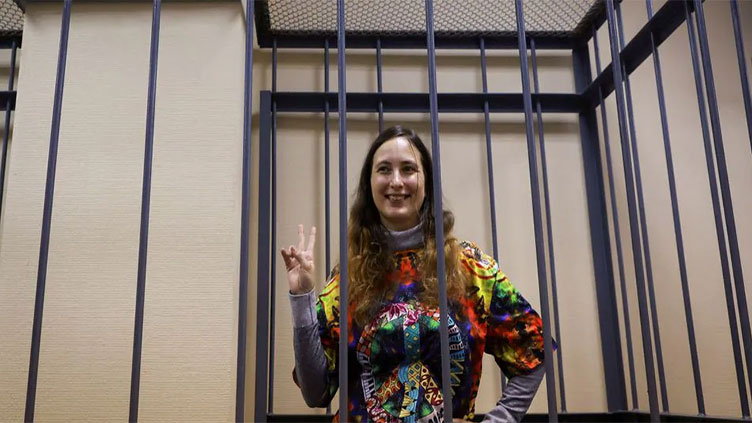Lawyer asks judge to acquit Russian artist over 'crime-free' anti-war price tag protest

World
Lawyer asks judge to acquit Russian artist over 'crime-free' anti-war price tag protest
(Reuters) - Lawyers for a Russian artist who faces up to eight years in prison for replacing supermarket price tags with demands for an end to Moscow's war in Ukraine told a court on Monday their client would not survive a jail term and must be freed.
Critics say the case of Alexandra Skochilenko, 33, is part of a crackdown on anyone who speaks out against Moscow's "special military operation" that has triggered nearly 20,000 detentions and over 800 criminal cases.
After it sent troops into Ukraine on Feb. 24 last year, Russia tightened its laws on dissent to try to silence critics Moscow regards as unacceptably divisive when the country is locked in what President Vladimir Putin has portrayed as an existential struggle with the West.
Skochilenko, an artist and musician known as Sasha to her friends, has admitted replacing price tags in a supermarket in her native St Petersburg on March 31 2022 with small pieces of paper urging an end to the war and criticising the authorities.
But Skochilenko, who has already spent over a year-and-a half in prison in St Petersburg, denies the formal charge of knowingly spreading false information about the Russian army.
She could be sentenced to eight years in a penal colony after a state prosecutor asked a judge for such a punishment. The prosecutor also asked for her to be banned from using the Internet for three years for committing what he has described as a serious crime out of "political hatred" towards Russia.
In the hearing in St Petersburg on Monday, two of her lawyers appealed to the presiding judge to acquit Skochilenko who, they said, had only acted on her conscience and had committed no crime.
"You should never punish people for thinking and feeling differently. You should never punish people for objective criticism of the authorities and their decisions," lawyer Yana Nepovinnova said.
"There can be only one verdict - an acquittal. Times change, but our actions remain forever in history and on our conscience. I will finish my speech with a quote from my confidante Alexandra Skochilenko: 'This is a test of your humanity. You have a chance to pass it.'"
For Skochilenko, who was already suffering from poor health before her arrest, what she called an "inhuman" sentence could be fatal, she said.
"Alexandra won't survive in a penal colony," she said.
Supporters clapped the lawyer when she finished her speech, angering the judge who said her courtroom was not a circus and adjourned proceedings until Tuesday when she said the proceedings would be closed to the public.
Skochilenko will have a chance to make a final statement to the court before the verdict, which could be delivered on Tuesday or in the following days.
'PRISONER OF CONSCIENCE'
According to the Russian-language Mediazona outlet, Skochilenko told the court on Nov. 3:
"I just wanted to stop the war - that was my motivation. Not hatred, but compassion. I am sure that every person in this room does not want there to be a war.
Amnesty International has declared Skochilenko "a prisoner of conscience" - someone who is imprisoned solely because of who they are or what they believe.
Copies of the imitation price tags produced by Skochilenko are on display on a website maintained by her supporters.
One of the tags seen on the website accuses the Russian army of bombing a theatre in the port city of Mariupol where around 400 people were hiding - a charge Moscow says is false.
Another alleges Russia was sending conscripts to fight in Ukraine, which Russia has also denied. A third cites alleged Russian casualty figures and accuses state TV of not talking about them, and a fourth accuses President Putin of lying and speaks of "pointless deaths".
The Kremlin says Moscow was forced to send troops into Ukraine to protect Russian-speakers there and stop the creeping expansion of the NATO military alliance. The West and Kyiv accuse Moscow of waging a colonial war of conquest.


